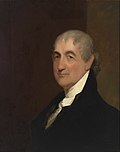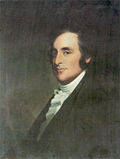| |||||||||||||||||
| |||||||||||||||||
 County results Strong: 50-60% 60–70% 80–90% Dexter: 50–60% 60–70% | |||||||||||||||||
| |||||||||||||||||
The 1815 Massachusetts gubernatorial election was held on April 3, 1815, in order to elect the Governor of Massachusetts. Incumbent Federalist Governor Caleb Strong won re-election against Democratic-Republican candidate Samuel Dexter in a rematch of the previous election. [1]


